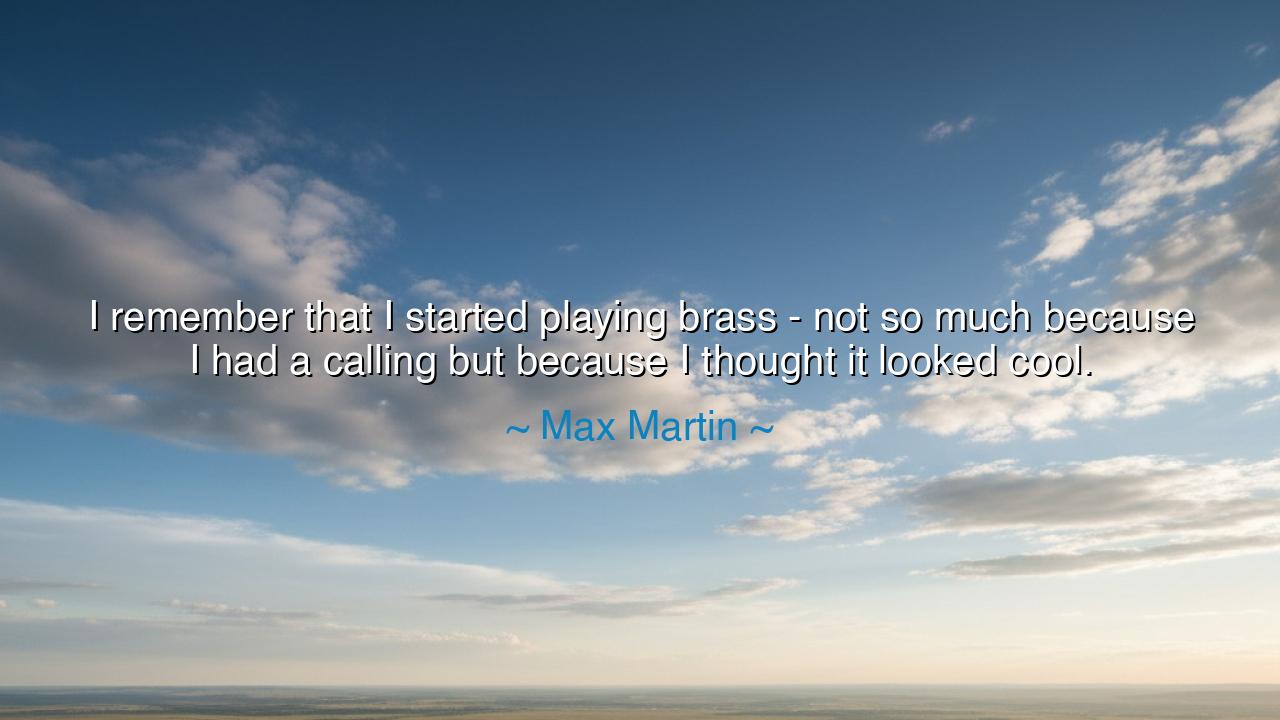
I remember that I started playing brass - not so much because I
I remember that I started playing brass - not so much because I had a calling but because I thought it looked cool.






"I remember that I started playing brass - not so much because I had a calling but because I thought it looked cool." – Max Martin.
In this candid reflection, Max Martin, the famed music producer, speaks to the initial spark of his creative journey—one that began not from a deep, spiritual calling, but from a simple, human desire to engage with something that appeared attractive and exciting. His words highlight an essential truth: sometimes, our greatest pursuits and most significant passions begin not with grand inspiration or divine purpose, but with a curiosity or a desire sparked by external factors. For Martin, it was the visual appeal of brass instruments that first drew him in, and from that initial interest, a lifelong career in music and production was born. This reveals the power of initial attraction—that first glimpse of something that piques our interest can set us on a path that ultimately leads to a deeper, more purposeful engagement.
This notion is reflected in the teachings of Socrates, who often suggested that we should start by examining what we love or desire, for it is through these desires that we find the true path to wisdom and growth. For Socrates, the key was not to ignore our initial inclinations but to examine them deeply. The philosopher understood that human curiosity often leads to profound discoveries, not necessarily because we begin with a grand purpose, but because we follow our interest and develop it over time into something greater. Martin’s admission about the beginning of his journey mirrors this ancient wisdom: even the seemingly superficial motivations, like thinking something "looks cool," can lead us to deeper self-discovery and lasting fulfillment.
The Renaissance era is another testament to this truth, where many of the period’s greatest artists and thinkers did not begin their journeys with a divine calling, but through a fascination with the world around them. Leonardo da Vinci, for instance, was initially drawn to art and science not out of some lofty philosophical pursuit, but by his deep curiosity about the natural world. His early sketches and studies were driven by interest—the desire to understand, replicate, and express the beauty he observed. As with Martin, Da Vinci’s curiosity turned into a passion, which eventually transformed the world. His journey reminds us that inspiration often starts in the most humble places, whether from an aesthetic attraction or the simple wish to explore something new.
Take also the story of Michelangelo, whose mastery of sculpture began as a young man working in a stone workshop, driven by a desire to understand the materials and tools of the craft. Though Michelangelo later became known for his deep spiritual connection to his work, his early days were shaped by a fascination with the act of creation itself—by the sight of the stone and the potential he saw in it. Like Martin, Michelangelo’s early attraction to the artistic form wasn’t driven by a grand sense of calling but by a simple, innocent curiosity and the willingness to explore something that intrigued him. His eventual genius arose from the seed of interest that he nurtured over time.
The lesson from Martin’s words is profound: initial interest, no matter how trivial or surface-level it may seem, can lead us to great discoveries and profound passions. In our own lives, we should not dismiss our curiosities or the things that seem merely attractive at first. Passion and purpose can emerge from the simplest beginnings. We may be drawn to something because it looks cool, but that initial attraction can set us on a course that, over time, reveals much deeper meanings and leads to unexpected accomplishments.
Moreover, Martin’s reflection reminds us that passion does not always need to start with a grand calling. Many great accomplishments begin with the smallest impulses—a simple interest or a fleeting moment of curiosity. By allowing ourselves the freedom to explore those impulses, we open ourselves to new experiences that can ultimately shape our future. The story of Martin’s journey in music shows that sometimes the first step doesn’t need to be driven by clarity or profound inspiration—it can simply begin with wonder and a desire to explore what excites us.
In our own lives, we can take Martin’s words as a reminder to embrace the interests and curiosities that come our way, no matter how insignificant they may seem. Whether we find ourselves drawn to a new hobby, a new field of study, or a new career, it’s important to honor that initial spark. We must remain open to where it may lead, for we never know when the things that "look cool" today might grow into something that shapes our future in profound and unexpected ways. Let us approach each new attraction with curiosity, knowing that the road from interest to passion is often paved with unexpected discoveries and unforeseen fulfillment.






AAdministratorAdministrator
Welcome, honored guests. Please leave a comment, we will respond soon